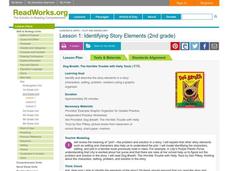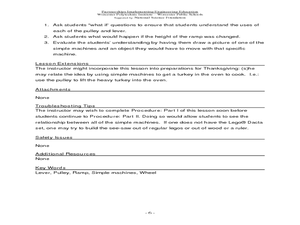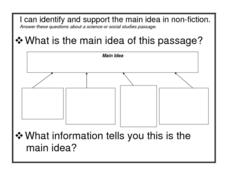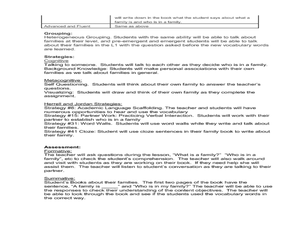Curated OER
Identifying What is Different
What is the same, what is different, and what does it all mean? Introduce the concept of identifying similarities and difference to your Kinder class using the I do, we do, you do, instructional approach. You'll provide structured...
Curated OER
Identifying the Problem and the Solution in a Story
Story elements: the problem and the solution. Help your youngsters identify these elements by reading Bringing Down the Moon, by Jonathan Emmett. After a class discussion and chart creation discussing problems and solutions from past...
Curated OER
Identifying the Solution in a Story
Using the book My Red Balloon by Eve Bunting, Kindergartners will gain an understanding that stories often have solutions. Using Eve Bunting's book as an example the teacher will identify the solution to the story and...
Curated OER
Identifying Story Elements
Second graders explore story elements. In this language arts lesson, 2nd graders identifying characters, setting, and plot in familiar stories. Students listen to a story and complete a graphic organizer.
Curated OER
Lesson 1: Identifying an Author's Purpose
Different types of text are written for very different reasons. Learners discuss the differences in writing to entertain, to inform, and to persuade their audiences. They work on identifying the author's purpose by reading and charting...
Curated OER
Identifying Author's Purpose in a Newspaper
Fourth graders read the newspaper and identify the author's purpose. In this language arts lesson, 4th graders read two sections of the newspaper and analyze the characteristics of each section. Students explain in writing how they know...
Curated OER
Identify Themes in Biographies
Fourth graders identify the theme based on the main events of the book A Picture Book of Anne Frank. In this themes worksheet, 4th graders discuss the themes of biographies and also read Sojourner Truth.
Curated OER
Using Blood Tests to Identify Babies and Criminals
Students solve a crime by matching a suspect's blood type to physical evidence collected at the crime scene. In this forensic science lesson, students identify the different blood types. They explain how blood tests work.
Curated OER
Stress Reduction Identifying and Combating Stressors
Students discover the warning signs of stress and explore how to use diet, exercise, relaxation techniques, and attitude to combat stress in their lives.
Curated OER
Identifying Minerals
Learners compare and constrast a wide variety of minerals and rocks. They test them for streak, luster, color and other characteristics. They view an exhibit and compare their answers to them.
Curated OER
Identify and Graph Linear Equations
Students investigate linear functions. In this mathematics activity, students plot points onto a graph by solving the equations y=x and y=mx+b by being given numbers for x and solving for y.
Curated OER
Identify and use Simple Machines
Students are exposed to simple machines and their uses. In this everyday tools activity, students watch a demonstration on how a lever, pulley, ramp, and wheel works. Students are given the opportunity to use hands-on techniques to...
Curated OER
Making Inferences While Identifying Similes and Metaphors
Use this lesson to study similes and metaphors and the inferred meaning. In this language arts lesson, 5th graders write their own similes and metaphors. A worksheet is provided for extension work or to check understanding as homework.
Curated OER
Comprehension: Identify the Main Idea from Text
Children in first grade listen and read along with the teacher to practice main idea identification. They use the provided reading passages to read, locate the main idea and supporting details. This is a fully scripted lesson which means...
Curated OER
Identify and Discuss the Author's Purpose
Examine author's purpose in a persuasive text using this scaffolded plan. You essentially have a verbatim script here, but it can definitely be used as an outline instead. Review questions that readers should ask themselves when...
Polk Bros Foundation
I Can Identify/Infer Motive
Why do people and characters act as they do? Require your class figure out the motivation of two people or characters they read about in a given text. In the short charts, pupils note down who, what they do, and why they do it. After...
Polk Bros Foundation
I Can Identify and Support the Main Idea in Non-Ficiton
Analyze a historical or scientific informational text by determining the main idea and supporting details. This graphic organizer allows pupils to write down the main idea and four details.
Polk Bros Foundation
I Can Identify and Infer Character Traits
Use the guiding questions on this page to fill out the two graphic organizers included in the materials tab. All of the materials focus on character or personality traits and ask pupils to find textual evidence of the traits they...
K12 Reader
Working with Figurative Language
Are your middle schoolers able to identify the literary devices featured on this worksheet? They must demonstrate their understanding of figurative language by matching the terms with their definitions and label the devices...
Curated OER
Identifying Opportunity Cost
Students work together to examine the concept of opportunity costs. They complete a practice problem and solve other problems during the class period. They share their solutions with the class.
Curated OER
Identifying Family
A reading of Stella Blackstone’s, Bear’s Busy Family launches a genealogy writing project. Young researchers use key words from the story, daddy, sister, uncle, etc., to write stories to illustrate and combine into a family book. While...
Curated OER
Use Details from Text to Identify Cause and Effect, Draw Conclusions, Compare and Contrast
Third graders discuss research topics and write a paragraph on one of the provided questions. They focus on including key words from charts that the class has been compiling. They underline supporting details within the text they write....
Curated OER
Shakespearean Puns
Tickle your funny bone with a instructional activity that presents five famous puns drawn from Shakespeare's Richard III, Romeo and Juliet, Hamlet, and Much Ado About Nothing. Readers identify the play on words as a...
K12 Reader
Adjective Antonyms
Easy or hard? Fast or slow? Invite your class members to practice with antonyms. They identify each adjective and then use provided antonyms to rewrite the sentences.
Other popular searches
- Identifying Context Clues
- Identifying the Main Idea
- Identifying Main Ideas
- Identifying Parts of Speech
- Identifying Nouns
- Identifying Point of View
- Identifying Topic Sentences
- Identifying Mood
- Identifying Parts of Plants
- Identifying Author's Purpose
- Identifying Authors Purpose
- Identifying Emotions

























